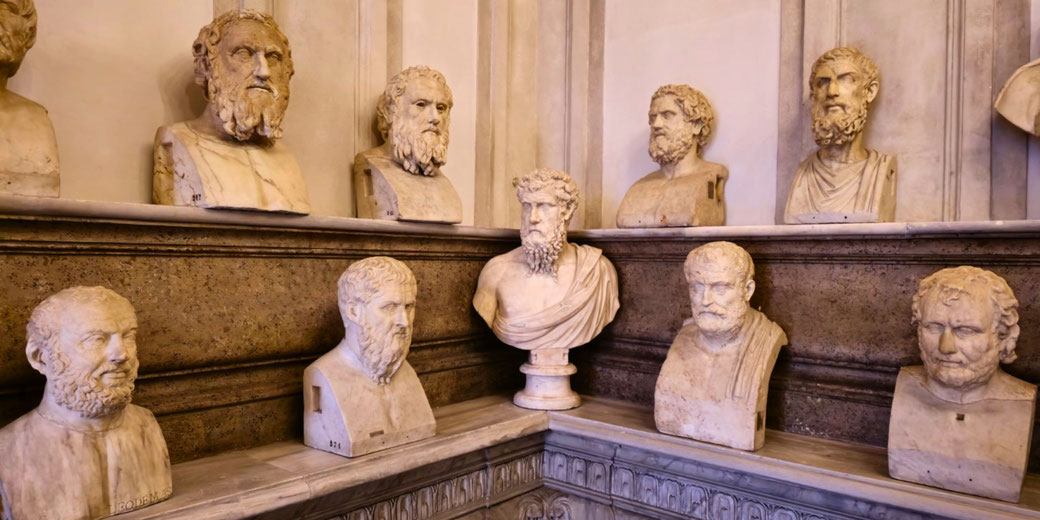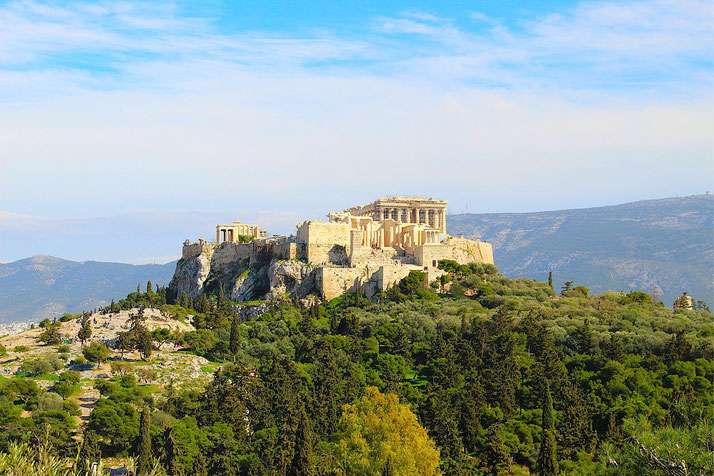Athens' Golden Age and the Delian League

In the mid-5th century BC, the ancient Greek city of Athens entered its 'Golden Age', which saw it quickly become a leading power in the Greek world thanks to its position as the leader of the powerful Delian League.
For almost 50 years, the city-state was the centre of remarkable revolutions in politics, architecture, and international diplomacy.
However, over time, it began to abuse its power over the other cities and oppress them, which would ultimately lead to the greatest conflict in the ancient Greek world.
Rise of the Delian League
After the Greco-Persian Wars, which lasted from 499-479 BC, the Greek city-states were victorious but cautious.
While the Persian Empire had been defeated, they still posed a threat to the Greeks, since they remained a dominant power in Asia Minor and the Aegean.
In order to protect themselves from future invasions, many of the Greek city-states formed the Delian League in 478 BC, which replaced the Hellenic League that had been led by Sparta.
The new league was named after the island of Delos in the Aegean Sea, which was where the league's treasury was initially kept.
The Delian League was originally intended to be a voluntary association of city-states.
At its height, 330 different city-states were members. However, Sparta and some of its allies chose not to join it.
Each state contributed ships and soldiers to the league's defence. This coalition had a common goal: to share resources and military knowledge to protect each other from Persian aggression.
Athens was considered to be the leading city-state of the new alliance since it had a large and experienced naval force, which held a strong reputation after its victory at the Battle of Salamis.
While the member cities were considered independent states, it was Athenian officials who became the administrators for the League.
For example, Cimon became the commander of the League’s military forces, while Aristides was responsible for assessing the annual financial obligations of each member state.
Under Cimon's leadership, the League had several early successes. In 478 BC, the settlement of Byzantium was captured, giving the Greeks access to the Black Sea.
Between 476 and 475 BC a number of cities in southern Asia Minor were captured from the Persians, while others were encouraged to revolt.
However, a number of actions by the Athenian forces during this time began to raise some concerns among the member states.
In 472 BC, a non-member Greek city-state called Carystus was forced, against its will, to join the League and pay an annual fee to do so.
Then in 470 BC, one of the member states, Naxos, sought to leave the League.
However, this was seen as an act of betrayal. Naxos lost its independence and was forced to pay an annual tribute.
Then, in 468 BC, a decisive battle between the Persians and the Delian League took place.
At the time, the Persian king, Xerxes I, had been assembling his forces of men and ships at the Eurymedon River in Pamphylia, in southern Asia Minor.
Cimon's fleet attacked an approaching Phoenician allied fleet by surprise, which totally annihilated the ships and crews.
This loss was so significant that Xerxes accepted the Delian League terms of peace in 449 BC, called the Peace of Callias.
It included an agreement that Persian forces would approach no closer than a day’s sail from the coast of Asia Minor.
The League's success at the Battle of Eurymedon seemed to have achieved all of the alliance's initial aims: to eliminate the Persian threat to Greeks in the Aegean and in western Asia Minor.
Therefore, it might be assumed that the League could be dissolved. However, Athens did not think that would be in their best interests.
From Delian League to Athenian Empire
After the Battle of Eurymedon, the League continued to exist as a naval force.
Athens had argued that the Persian threat was still real, despite their victories.
However, the League's policies and activities became focused on what the city of Athens wanted.
As a result, it appeared that Athens was gradually turning the Delian League into their own personal empire.
There is no single event or year that can pinpoint when the Delian League became the Athenian empire.
In reality, the process occurred over the course of several years. Although, there were some major events that highlighted the increasing dominance of Athens over the other member states.
In 465 BC, Thasos, the wealthiest island in the northern Aegean, had an economic disagreement with Athens about trade.
In protest, Thasos declared that they were no longer part of the Delian League.
In response, Cimon sailed the League's fleet to the island and laid siege to it.
This was the first time the League's resources had been used in aggression against another League member.
Thasos appealed to Sparta for help, but they were unable to support them due to internal problems.
Without any support, Thasos fell to the League's forces after a two-year siege.
As punishment for their actions, Thasos' navy was confiscated, they were forced to pay a large monetary fine, they had to give up their political independence, and they were forced to pay an annual fee to the League.
The frightening speed with which the League's own military was used to force a member state to remain in the alliance was a sign of Athens' ruthlessness.
The rise of Pericles
Ever since their cooperation in the Greco-Persian Wars, Athens and Sparta had enjoyed a positive relationship.
Cimon himself advocated that the two cities work closely together for the future of Greece.
In 464 BC, when Sparta was hit by a devastating earthquake, which was followed by an armed revolt from the helots, Cimon recommended that Athens march their soldiers to help the Spartans.
However, another Athenian politician, called Ephialtes, argued that Sparta and Athens were traditional enemies, and that help should not be sent.
One of Ephialtes' political supporters was a young man called Pericles, who had been gaining popularity.
Despite the political opposition, Cimon was given permission by the Athenian Assembly to lead 4000 hoplites to Sparta.
Unfortunately, Sparta had begun to distrust Athenian motives based upon their treatment of the League's allies, and they feared that Cimon intended to extend Athenian control over Sparta.
As a result, they refused Cimon’s help and ordered his forces to return to Athens.
Sparta's rejection of Cimon significantly damaged his political reputation in Athens.
When Cimon returned to the city, he was shocked to discover that his political enemies had gained much more power while he was away.
Cimon's humiliation culminated in 461 BC, when he was officially ostracised, which required his banishment from Athens for 10 years.
During this time, Pericles rose to dominate Athenian politics, and he advocated an aggressive imperial policy and separation of Athenian and Spartan interests.

Athens' Golden Age
During Pericles' time in power, from around 460-430 BC, Athens entered a 'golden age'.
This time of power and prosperity can be attributed to a number of factors. One factor could be the development of democracy in Athens.
Democracy is a form of government where all citizens have an equal say in decisions made about the state.
In around 508 BC, Cleisthenes introduced reforms that allowed Athenian citizens to participate in government.
This helped create a more equal society. Then, a series of new reforms implemented by Pericles made Athens' democracy more direct, giving all male citizens the right to participate in the assembly and serve on juries.
Another cause of Athens' golden age was the Greco-Persian Wars. Although the war was devastating to the city of Athens when it was burnt to the ground by the Persians, it also provided a number of benefits.
The war made Athens more militaristic and disciplined. It also increased trade and commerce, as Athens became a major maritime power during and after the war.
A final factor that contributed to Athens' golden age was their rich natural resources.
They had silver mines, which provided them with increased wealth.
As the most influential member of the Delian League, Athens also benefitted economically from the League.
They used the money from the alliance to fund personal projects. In fact, Pericles had transferred the Delian League's treasury from Delos to Athens in 454 BC, claiming that he did so to protect it from Persia.
However, many of his critics claimed that it centralised power of the League in the hands of Athens.
Using their control over the treasury, Athens then required other league members to pay an annual fee rather than to supply ships and men.
This influx of money was spent to rebuild Athens and enhance its own prestige.
Athens also increased the strength of its navy during this period. This new navy allowed them to control trade in the Aegean Sea and expand their empire.
The increase in wealth and power meant that Athens attracted a lot of attention.
As a result, many people seeking to advance their careers were drawn to the city.
During Athens' golden age, the city-state became a center of learning.
Pericles' building projects
Under the rule of Pericles, Athens invested heavily in public works projects like the Parthenon.
The Parthenon is a temple that was built to honor the goddess Athena and is located on the Acropolis, the largest hill in Athens.
The sculptor Phidias oversaw its construction between 447 and 432 BC.
It was in this new temple that the Delian League's treasury was stored, and much of the construction project was paid for from its funds.
In addition, Pericles used the money to build the 'long walls' which joined Athens to its port, Piraeus.
Once completed in 457 BC, it was meant to provide greater security for goods being transported from the port to Athens itself, as well as providing defensible structures against potential land invaders.

Causes of the Peloponnesian War
The golden age of Athens came to an end due to the Peloponnesian War, which was fought between Athens and Sparta from 431-404 BC.
There were many causes of this war, but one of the main ones was the growing threat of Athens.
Sparta was worried that Athens would become too powerful and decided to take action.
The trigger for the conflict was a disagreement between Athens and Corinth, a city-state that was allied with Sparta.
This dispute led to tensions between the two city-states, and eventually, Sparta stepped in and the war began.
Over a 30-year period, both sides of the conflict suffered heavy defeats and some crucial victories. However, it eventually ended in a victory for Sparta.
Following their success, Sparta officially disbanded the League and reduced Athens' power in the Aegean.
Aftermath of the Peloponnesian War
Their loss in the Peloponnesian War had many repercussions for Athens.
The conflict destroyed much of Athens' trading infrastructure and killed many of its people.
This caused a major decline in Athens' power and wealth.
The Peloponnesian War also led to the rise of Sparta. It had always been a strong city-state, but after the war, they became the most powerful city-state in Greece.
This would have long-term consequences for the Greek world.
Despite its eventual end, the Athens golden age created a lasting legacy. The building projects, art and literature that were created during this time still have an impact on the world.
Further reading
What do you need help with?
Download ready-to-use digital learning resources
Copyright © History Skills 2014-2025.
Contact via email
With the exception of links to external sites, some historical sources and extracts from specific publications, all content on this website is copyrighted by History Skills. This content may not be copied, republished or redistributed without written permission from the website creator. Please use the Contact page to obtain relevant permission.





